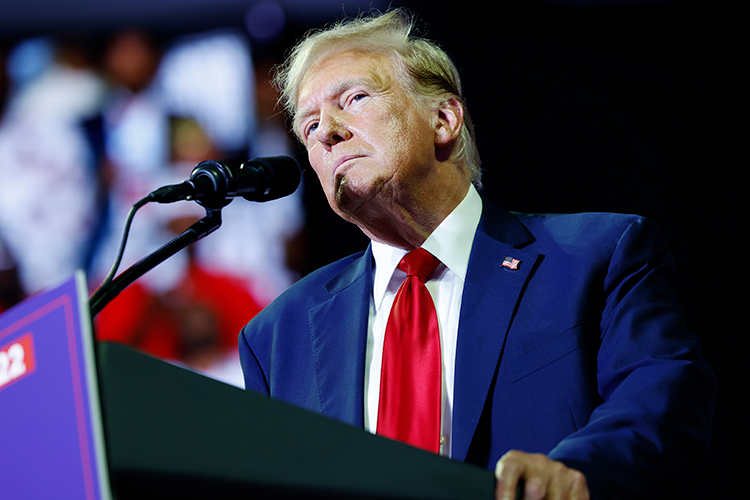Concerns Raised Over Legality of Law Firms’ Deals with Trump
April 24, 2025, 2:26 pm CDT
Sixteen Democratic lawmakers have sent letters to nine law firms requesting disavowal of their agreements with President Donald Trump. (Photo by Anna Moneymaker/Getty Images)
Sixteen Democratic lawmakers have taken action by sending letters to nine law firms, questioning the legitimacy of their recent agreements with former President Donald Trump. The letters call for these firms to disavow their deals and clarify their legality.
The initiative is led by U.S. Representatives Dave Min from California and April McClain Delaney from Maryland, both of whom have backgrounds in law, as stated in a recent press release and reported by ABC News.
Among the firms receiving these letters are some of the largest in the legal sector: Skadden, Arps, Slate, Meagher & Flom; Paul, Weiss, Rifkind, Wharton & Garrison; Milbank; Willkie Farr & Gallagher; Kirkland & Ellis; A&O Shearman; Simpson Thacher & Bartlett; Latham & Watkins; and Cadwalader, Wickersham & Taft.
The agreements in question involve commitments from these firms to allocate millions of pro bono hours to support issues aligned with both the firms and Trump’s agenda. These arrangements were designed to safeguard the firms against executive orders that could complicate their lawyers’ security clearances and affect their clients’ government contracts.
According to the letters sent to the firms, the continuation of such agreements potentially violates several legal statutes. Specific concerns noted include:
- Potential breaches of federal bribery laws if something of value is offered to influence official actions.
- Possible violations of the Hobbs Act, criminalizing extortion that affects commerce.
- Concerns about breaches of federal anti-fraud laws aimed at ensuring public officials provide honest services.
- Involvement in a racketeering enterprise, as prohibited by federal law.
- Possible infringements of state laws that ban providing benefits to public servants as a means to influence their actions.
The inquiries from the Democratic lawmakers coincide with previous questions posed by U.S. Sen. Richard Blumenthal and U.S. Rep. Jamie Raskin. Their prior letters aimed to gather information about attempts to recruit lawyers and clients from one of these firms and to ensure retention of relevant records connected to the executive orders. Their stance characterized these agreements as compromises that could inhibit legal representation opposed to Trump’s interests.
The April 24 correspondence expresses serious concerns regarding the legal ramifications for the firms involved. It highlights the potential for complicity in undermining the rule of law, indicating that these deals may effectively transform private attorneys into advocates for Trump’s interests rather than impartial legal representatives.

